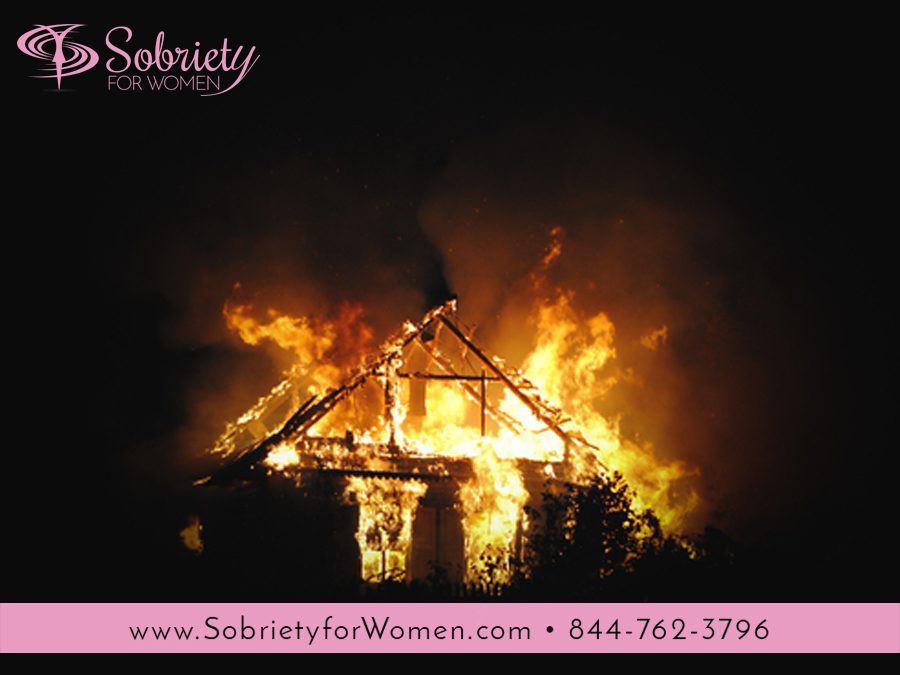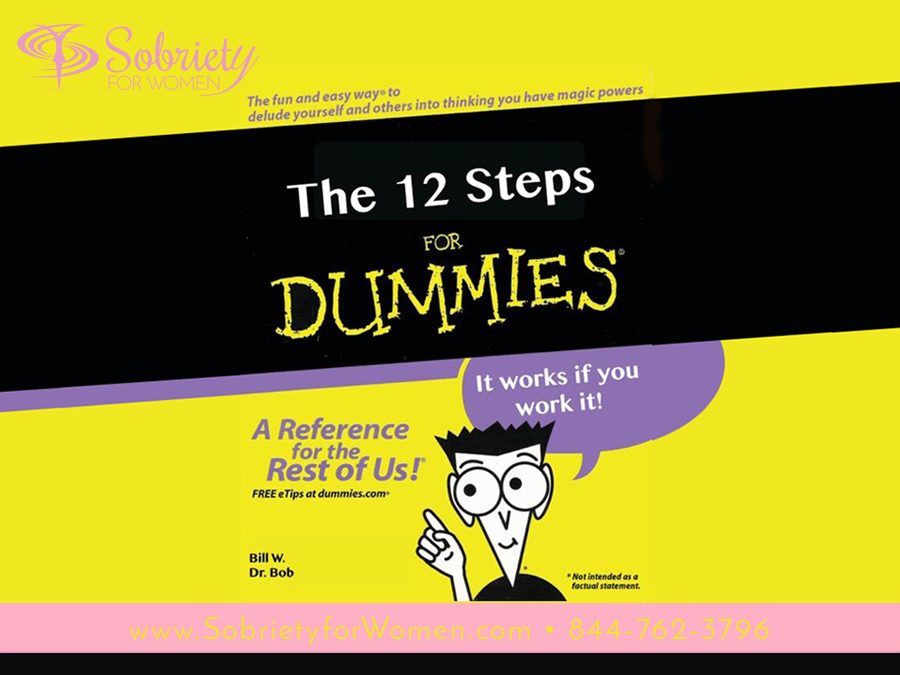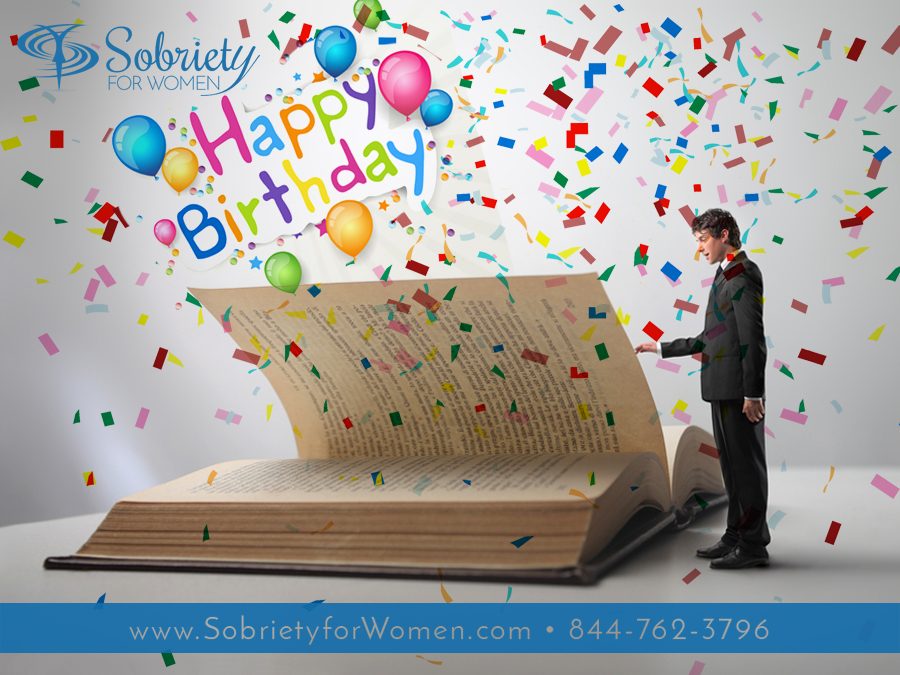
by Sally Rosa | Jun 16, 2015 | Addiction Articles, Sobriety For Women
One Question? It’s Really That Simple?
First, let me say that nothing written below is original. I didn’t come up with any of it. They’re my words, but the ideas all belong to twelve-step fellowships.

With that disclaimer out of the way – do you think you’re an alcoholic? Maybe you’re drinking too much on weekends. Maybe you’re drinking too much on weekdays. Maybe you’re drinking in the morning, at work, and until you pass out at night.
We all have different definitions of what alcoholism is. There’s the medical and scientific definition, the twelve-step definition, the treatment definition…the list goes on.
With all these conflicting definitions, how can anyone ever REALLY be sure they’re drinking alcoholically?
Well, dear readers, time spent in active alcoholism and in recovery have given me an answer! It’s a question to ask yourself. It’s pretty straightforward and commonsense. It shouldn’t be hard to answer either.
Can I Picture a Life Without Alcohol?
That’s it. From my time spent in the rooms of recovery (almost ten years), I’ve learned that asking yourself this simple question can speak volumes.
Can I picture a life without alcohol? If the answer is yes, then you’re probably not an alcoholic. If booze isn’t that important to you, if it’s merely something that enhances social situations or relieves a bit of stress, then you’re 99.9% not an alcoholic.
Can I picture a life without alcohol? If the answer is no, then you’re in trouble. If you absolutely cannot picture a life in which you don’t drink, something’s wrong. It doesn’t 100% mean you’re an alcoholic, but it does make things complicated.
But Fiona, you might be saying, I can’t picture a life without alcohol…but it’s only because I want to drink at my wedding!
Guess what? That’s alcoholic thinking. Again, it doesn’t mean you’re 100% an alcoholic, but that’s the type of thinking I displayed time and time again in active alcoholism.
See, my wedding isn’t guaranteed. I think I’ll get married one day, but it’s in the future and I can’t predict the future. So, if I can’t picture getting married without drinking, well, things are already looking bad. That means I can’t picture a future date, which may or may not happen, without alcohol!
Sounds a bit alcoholic to me!
Not Convinced?
Still not convinced that this simple question can help determine if you suffer from alcoholism or not? Fair enough. It’s a bold claim, right? Saying that a single question can accurately gauge a complex mental, emotional, spiritual, and physical disease is a bit of a stretch.
It’s not too much of a stretch though. Most good things in this world (religion, government, etc.) are based on simple ideas. Alcoholism is no different.
Religion is based on the idea that being connected to God and living a good life will payoff in eternity. Government is based on the idea that civilizations need a source of order and protection. Alcoholism is based on the idea that alcohol fills a void in the alcoholic.
If you can’t picture life without alcohol, well, you’re probably using it to fill a void inside your heart and soul. I say this as someone who struggled with that void for years. Guess what I eventually found out?
No amount of booze can make me feel whole. The only way I know to be “happily and usefully whole” is to be sober and be of service to others.
If you think you have a problem with alcohol, ask yourself that question. Ask yourself if you can picture a life without alcohol. Ask yourself honesty and answer honestly.
The answer may just surprise you.

by Fiona Stockard | Jun 2, 2015 | Addiction Articles, Sobriety For Women
We Didn’t Start the Fire!
Welcome back to Halfway House Chronicles: One Woman’s Story of Early-Sobriety. I hope you liked the first one, ‘cause I have lots more where that came from!

When I was coming up with my list of which interesting experiences to write about, I kept coming back to the idea that they should be more than funny stories. I mean, fun and games are good…but where’s the value? Where’s the spiritual lesson in telling humorous stories about early-recovery?
With that in mind, all Halfway House Chronicles are going to have some sort of lesson attached to them. They’ll have some nugget of wisdom I’ve distilled from my (somewhat crazy) early-sobriety antics.
Today, I’d like to share with you all about the time I lit a fire in my sober living house and end with a reflection on God-centered thinking. Sounds like a jump, right? Then read on!
Okay, Maybe We DID Start the Fire…
I was living in the same halfway house I talked about last time. My roommates who were secretly getting high had been kicked out. I got a new roommate who I loved and, more importantly, who was working to better herself spiritually.
We’d go to meetings together, discuss the Big Book together, do yoga together, meditate together, and talk to boys together. In short, we were inseparable and not always for the best reasons!
One day, we were hanging out on the other side of our halfway house “complex” (the house was actually a bunch of apartments in a large complex). We were smoking cigarettes and talking to two boys who were up on their porch.
They started throwing little bits of gravel at us, so, of course, we threw our cigarettes up at them. Makes sense, right? Oh the strange logic of early-sobriety!
Anyway, one of our cigarettes must have fallen from their porch to the bushes in front of us ‘cause, within a minute or two, we noticed A LOT of smoke coming from the bush. We’d accidently lit it on fire!

this is what the fire looked like in my head!
I started freaking out and yelling about how we were going to get kicked out (I probably should have been yelling about how we could have burned the place down). Thankfully, my roommate was more levelheaded. She ran up into the boys’ apartment, grabbed a bucket of water, and dumped it on the bush.
That got rid of the fire and the immediate emergency. At our house meeting a few days later, my roommate and I got called out for going into the boys’ apartment. Apparently someone had seen my roommate run into their house to get water!
I was furious because a) I hadn’t gone into their apartment and b) my roommate only did it to extinguish the fire! I tried explaining that to the owner and house managers. Of course, they weren’t very understanding. They didn’t kick us out, but we were now on thin ice.
And they were right! One of the house managers, the same one who’d given me such good advice when I called her about my old roommates using, took me aside and gave me some MORE advice I still remember to this day.
A Lesson in Humility & God
Here’s where the lesson I was talking about earlier enters the picture (told you we’d get there!). This woman, who I now think was an angel sent into my life to help me during early-recovery, told me a few things.
First, she pointed out that my roommate and myself wouldn’t have had to get water to extinguish the fire if we hadn’t been at the boys’ apartment in the first place. Okay, that’s pretty obvious right? It hit me like a ton of bricks!
She explained that I was looking for attention and outside validation, which is normal for an alcoholic, when I should have been looking to strengthen my relationship with God.
She sat down with me (ironically right in front of where we’d started the fire!) and explained the difference between God-centered thinking and selfish thinking. God-centered thinking, she said, was when someone prayed and meditated and thought of how they could help people.
Selfish thinking, on the other hand, was what most alcoholics were used to. It was thinking about only ourselves and how to get what we want.
She then explained that although I was upset over this whole situation (and on early-curfew!), I could use it as a source of humility and a way to start practicing God-centered thinking. She told me that us alcoholics don’t learn things easily, that we have to bang out heads on the wall a few times to learn a simple lesson.
I can fortunately say I took her advice. I began to pray and meditate more seriously. I began to practice God-centered thinking AND living. Guess what? I haven’t started a fire since! That, my friends, is a miracle!

by Sally Rosa | May 12, 2015 | 12 Steps, Addiction Articles
A Breakdown of the Steps!
By: Tim Myers
Step One:
“We admitted we were powerless over alcohol — that our lives had become unmanageable.”
For Dummies:
I can’t stop drinking and it’s impossible for me to do anything without messing up. I try to stop but next thing I know…bang. I’m hammered, my family hates me, and all my bills are over due.

Step Two:
“Came to believe that a Power greater than ourselves could restore us to sanity.”
For Dummies:
I thought for a long time and now I’m at the point where I’m so crazy that only God himself can make me a sane person again. I mean, I’m really bonkers at this point. I need Jesus or Buddha or Something.
Step Three:
“Made a decision to turn our will and our lives over to the care of God as we understood Him.”
For Dummies:
Threw my hands in the air and decided okay, I’m done. God take this drunk and messy body do with it whatever the heck you want. I don’t care, just make all my decisions for me, okay?
Step Four:
“Made a searching and fearless moral inventory of ourselves.”
For Dummies:
Sat down, grabbed a pen or pencil, and made a list of all the stupid stuff I did, all the mean stuff I said. Just basically took a good look at all the crap I’d done and laid it all out in front of me. I’m feeling pretty crappy right now.
Step Five:
“Admitted to God, to ourselves, and to another human being the exact nature of our wrongs.”
For Dummies:
FREEEEEEDOOOOOOM! So get this, I told another person all the stuff I did and now I feel grrrrrreat! I mean, I’m still a huge jerk and all, but man does it feel good to get that all out in the open. Booya!
Step Six:
“Were entirely ready to have God remove all these defects of character.”
For Dummies:
I’m a thief, a liar, a cheater, a liar, overly dramatic, entitled, and about twenty other things. God, I’m ready for you to take them all. Oh, and you can keep ‘em btw.
Step Seven:
“Humbly asked Him to remove our shortcomings.”
For Dummies:
Told everyone how I talked to God and he took my character defects! Just kidding. In a non-flashy and quiet sort of way I talked to God and asked him take those defects. Oh, and I told him I don’t want ‘em back.
Step Eight:
“Made a list of all persons we had harmed, and became willing to make amends to them all.”
For Dummies:
Jotted down probably the longest list ever of all the people I did horrible stuff to. Yeah, I was a pretty awful person.
Step Nine:
“Made direct amends to such people wherever possible, except when to do so would injure them or others.”
For Dummies:
Sat down and looked each person who I was awful to in the eye and said, “Man, it was soooooo bad when I did that to you! Tell me what it is that I can do to make this whole thing okay.”
Step Ten:
“Continued to take personal inventory and when we were wrong promptly admitted it.”
For Dummies:
Just about everyday I sit down and write down all the ways I was a jerk. Then, I go and fix it…again!
Step Eleven:
“Sought through prayer and meditation to improve our conscious contact with God as we understood Him, praying only for knowledge of His will for us and the power to carry that out.”
For Dummies:
Dear God, oh God, My God, I pray to thee, show me how to help other people oh God. Or somethin’ like that (Tim McGraw what’s up!).
Step Twelve:
“Having had a spiritual awakening as the result of these steps, we tried to carry this message to alcoholics, and to practice these principles in all our affairs.”
For Dummies:
Repeat steps one to eleven with another messed up person and pretend you know what you’re doing.

by Sally Rosa | Apr 21, 2015 | 12 Steps, Addiction Articles
Happy 76th Birthday!

image via Wikipedia
Just a few days ago, April 10th to be exact, the Big Book celebrated its 76th birthday!
How cool is that? One of the most influential books of all time (if I do say so myself!) has been around for over seventy-five years. It’s helped millions of alcoholics recover from a seemingly hopeless state of mind and body. It’s restored families, saved marriages, and offered hope to so many people.
The Big Book is my favorite book and that’s coming from someone who LOVES books. I started and finished The Bell Jar this week and it’s only Thursday! Still, no other book compares to the Big Book. Perhaps that’s because no other book has literally saved my life (although a few have impacted me pretty substantially).
Anyway, that’s just my personal opinion of the book. Guess what? It’s gotten all sorts of other accolades over its seventy-six years! A quick Google search turns up some interesting details:
- The Big Book is one of the best selling books of all time. It’s thought to hover right around the 50th place mark. It’s sold, in total, over 30 million copies (yes, I said million!)
- The Big Book is included in Time’s list of the 100 most influential books of all time
- The Big Book was recognized by the United State’s Library of Congress as one of the eighty-eight “books that shaped America”
- Early after its release, one reviewer called the Big Book “the greatest redemptive force of the twentieth century.” The New York Times said the book was unlike any other book ever published. Another reviewer “called the book extraordinary and stated that it deserved the attention of anyone worried about the problem of alcoholism.”
And that’s just what a quick search turned up! Yeah, it’s safe to say the Big Book is one-of-a-kind and has changed addiction treatment forever.
How the Big Book Changed America
That’s a bold claim, right? Saying that the Big Book changed America isn’t just a statement. It’s a declaration and it needs to be backed up with fact. Well, guess what? It did change America.
The Big Book of Alcoholics Anonymous changed how America views and treats alcoholism and addiction. Before that fateful day in April of 1939, alcoholism was thought of in the same way it had been for hundreds of years. That is to say, alcoholism was viewed as shameful secret, a moral problem, and a personal failure.
Around the time AA was founded in 1935, doctors all over the country were starting to measure alcoholism by scientific, rather than moral, standards. The Big Book is an example of the right thing at the right time. Its publication coincided with an increasingly medical and scientific view of the disease of alcoholism (emphasis on the word disease).
After April 10th, 1939, alcoholism and addiction as a disease began to be widely accepted. Certainly this wasn’t only because of the book, but it galvanized thousands, and eventually millions, of people to see alcoholism in a whole new light.
Equally as important as the Big Book changing the paradigm of alcoholism treatment, is how it changed that paradigm. Remember, those in the medical community were already starting to think of alcoholism as a disease, but what about normal women and men? What about the wife up the street with an alcoholic husband? What about the store clerk with an alcoholic wife? What about the worried parents with an alcoholic child?
The Big Book spoke to these people directly. It used simple, everyday language to explain complex ideas. It spoke of spirituality in a way that made even the most agnostic or atheist person say, “Well, maybe they’re right.” It tackled issues of guilt, shame, remorse, sex, lies, and so much more with grace and dignity. In short, it gave a human touch to alcoholism.
Let’s all take a moment to be thankful it did. If the Big Book wasn’t written, well, I wouldn’t be typing these words. I’m willing to bet you wouldn’t be reading them. I’m indebted to this book and, of course, to Bill Wilson and Dr. Bob. It’s with the deepest respect that I take off my metaphorical hat and say Happy Birthday!








